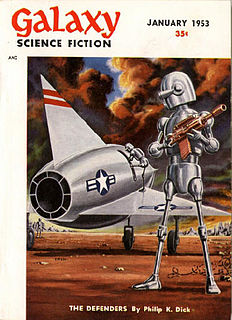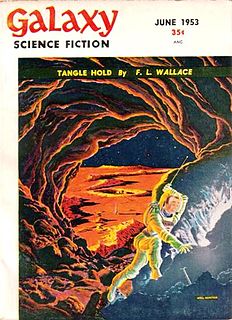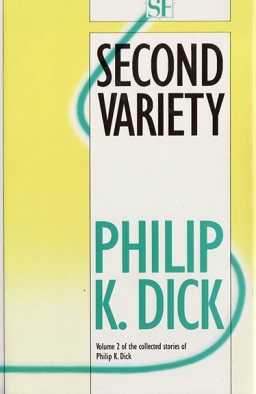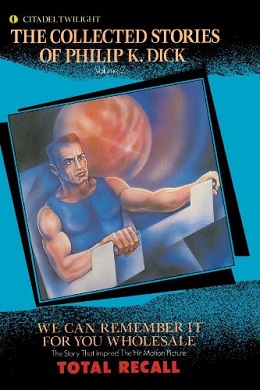"Autofac" is a 1955 science fiction short story by American writer Philip K. Dick that features one of the earliest treatments of self-replicating machines. It appeared originally in Galaxy Science Fiction of November 1955, and was reprinted in several collections, including The Variable Man published in 1957, and Robots, Androids, and Mechanical Oddities published in 1984.
"The Father-Thing" is a 1954 science fiction short story by American writer Philip K. Dick. The story, told through third-person narration but focusing on the child, concerns the replacement of a boy's father with a replicated version. At first, only the child sees the difference and has to recruit other children to help him reveal the truth. The story is typical of Dick's short stories of the period.
"Tony and the Beetles" is a science fiction short story by American writer Philip K. Dick, first published in Orbit Science Fiction, No.2, in 1953.

"Strange Eden" is a science fiction short story by American writer Philip K. Dick. It was first published in Imagination magazine, December 1954.

"Shell Game" is a science fiction short story by American writer Philip K. Dick. It was submitted to the Scott Meredith Literary Agency and received by SMLA on December 12, 1953. It was published in Galaxy Science Fiction in September 1954

"If There Were No Benny Cemoli" is a science fiction short story by American writer Philip K. Dick, first published in the December, 1963 issue of Galaxy magazine with illustration by Lutjens.

"The Defenders" is a 1953 science fiction novelette by American author Philip K. Dick, and the basis for Dick's 1964 novel The Penultimate Truth. It is one of several of his stories to be expanded into a novel. The story was first published in the January 1953 issue of Galaxy Science Fiction.
"Rautavaara's Case" is a science fiction short story by American writer Philip K. Dick. It was first published in 1980 in Omni magazine and subsequently in the 1985 short story collection I Hope I Shall Arrive Soon. The story was also included on We Can Remember It For You Wholesale, volume five of the Collected Short Stories of Philip K. Dick in 2003.
"Impostor" is a science fiction short story by American writer Philip K. Dick. It was first published in Astounding SF magazine in June, 1953.

"Planet for Transients" is a 1953 science fiction short story by American writer Philip K. Dick. The story was originally published in the October–November 1953 issue of Fantastic Universe. The story also appears in We Can Remember It for You Wholesale . The author's original title for the story was "The Itinerants".

"Colony" is a science fiction short story by American writer Philip K. Dick. It was first published in Galaxy magazine, June 1953. The plot centers on an expedition to an uncharted planet, on which the dominant, predatory alien life form is capable of precise mimicry of all kinds of objects. The size and complexity of the mimicked object can vary from simple doormats to whole spaceships with the larger objects usually attempting to trap and "absorb" humans similar to carnivorous plants.
"Expendable" is a science fiction short story by American writer Philip K. Dick. It was first published in The Magazine of Fantasy and Science Fiction issue of July 1953. The plot centers on an unnamed human being caught in the middle of the ongoing, million year conflict between the degenerate descendants of the insects and humans.

The Best of Philip K. Dick is a collection of science fiction stories by American writer Philip K. Dick. It was first published by Del Rey Books in 1977. Many of the stories had originally appeared in the magazines Planet Stories, Fantasy and Science Fiction, Space Science Fiction, Imagination, Astounding Stories, Galaxy Science Fiction, Amazing Stories, Science Fiction Stories and Startling Stories, as well as the anthologies Dangerous Visions and Star Science Fiction Stories No.3.

Second Variety is a collection of science fiction stories by American writer Philip K. Dick. It was first published by Gollancz in 1989 and reprints Volume II of The Collected Stories of Philip K. Dick. It had not previously been published as a stand-alone volume. Many of the stories had originally appeared in the magazines Fantasy Fiction, Fantastic Universe, Space Science Fiction, Imagination, If, Amazing Stories, Science Fiction Quarterly, Startling Stories, Cosmos, Orbit, Astounding and Planet Stories.

We Can Remember It for You Wholesale is a collection of science fiction stories by American writer Philip K. Dick. It was first published by Citadel Twilight in 1990 and reprints Volume II of The Collected Stories of Philip K. Dick replacing the story "Second Variety" with "We Can Remember It for You Wholesale". Many of the stories had originally appeared in the magazines Fantasy Fiction, Fantastic Universe, Fantasy and Science Fiction, Imagination, If, Amazing Stories, Science Fiction Quarterly, Startling Stories, Cosmos, Orbit, Astounding, and Planet Stories.

For the collection of short stories by Philip K. Dick, see Beyond Lies the Wub (collection).

"Mr. Spaceship" is a science fiction short story by American writer Philip K. Dick, first published in 1953 in Imagination in January 1953, and later in The Collected Stories of Philip K. Dick. It has since been republished several times, including in Beyond Lies the Wub in 1988.
"The Great C" is a science fiction short story by American writer Philip K. Dick. It was first published in 1953 in Cosmos Science Fiction and later in The Collected Stories of Philip K. Dick, and parts of the work along with Planet for Transients were later used in the full-length novel Deus Irae. It has since been republished several times, including in Beyond Lies the Wub in 1988.

"The Impossible Planet" is a science fiction short story by American writer Philip K. Dick, first published in the October 1953 issue of Imagination. It has been reprinted over 30 times, including Brian Aldiss's 1974 Space Odysseys anthology.
It was also published in Dutch, French, German and Italian translations. The writer originally submitted it to the Scott Meredith Literary Agency on February 11, 1953, with the title "Legend."















